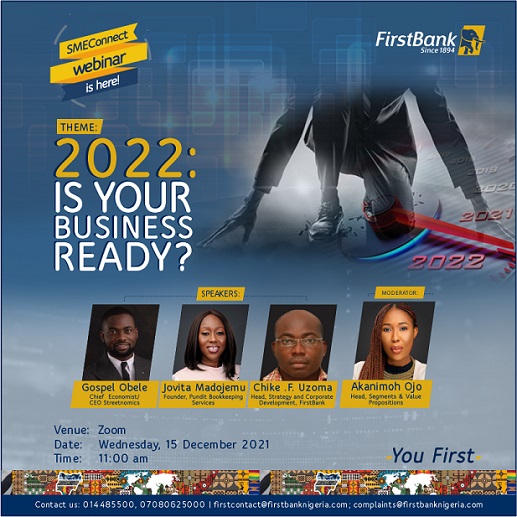By Eugene Onyeji
Small Medium Enterprises are ultimate drivers of the economy, and when under-utilized and not given the much-needed support to thrive, it has a telling effect on the economy.
But in demonstration of its continuous commitment to National development, FirstBank has again stressed it’s commitment to connecting SMEs to value offerings that will impact businesses while enhancing customer acquisition and establishing the bank as an SME-focused brand.
First Bank on Wednesday hosted a SMEConnect webinar to equip SMEs with relevant knowledge on how to strategize for success and growth in 2022.
The SMEConnect webinar series is themed “2022: Is Your Business Ready?”
A lot of valuable insights on economic trends, impact on SMEs and propose key strategies for business growth in 2022 were shared.
SMEConnect is FirstBank’s value proposition geared towards building the capacity of SMEs to deliver business goals and contribute even more significantly to national development. It is a digital platform through which SMEs can access the bank’s plethora of services. The portal is designed to help SMEs access the Bank’s unique propositions and identify various gaps that hinder business growth.
The event was moderated by First Bank MSME Client Value Proposition Team Lead, Akanimoh Ojo. The lead speaker was Gospel Obele, an economist, Bloomberg Certified Markets Analyst and CEO of Streetnomics.
In his presentation, he acknowledged that entrepreneurship is fairly strong in Nigeria due to the agility and aspirations of Nigerian businesses. He, however, identified limited access to finance, inadequate infrastructure and insecurity as the three main obstacles facing entrepreneurs in Nigeria.
Obele advocated that the business environment is changing as a result of business pressure dynamics, inflation and worsening Naira situation and will continue even in 2022, the pre-election year with more political correctness.
Obele list drivers of market behaviours in 2022 and predicted that Nigerian SMEs will deal in an increasing VUCA environment; that is volatile, uncertain, complex and ambiguous.
He emphasized the need for SMEs to begin to rethink their business model by not focusing on the product alone as products do not lead to business prosperity.
According to him, in remodeling for growth, SMEs have to start turning out products to build brands and see their business model as a solution to solving social problems as well as doing business for profit.
“It is only then you can move from a core product centric solution to a brand centric solution and be able to unlock resilience growth in a change economic climate like ours,” he said.
Obele concluded with hope that there will be more money in some sectors as SMEs think cluster, follow the money and right location.
The second speaker, Jovita Madojemu, a former banker, a business woman, chartered accountant and founder, Pundit Bookkeeping Services, spoke on how to maintain bookkeeping to crack the profit code, which she hinged on
1. The survival budget irritation.
2. The profit cash flow correlation
3. The performance tracking adoption
Madojemu said getting the budget right is very essential in scaling up your business growth and separating oneself from business is critical to cracking the profit code.
She warned that investor’s funds, loans and customer advances should not be seen as a gift but rather should be planned to turn into revenue which will ultimately yield to profit.
According to her, profitability is what sustains the business as she gave a standard chart for business report card to be:
Top Line – Revenue Mid Line – Gross profit Bottom Line – Net Profit
Read Also: MTN bleeds 7.45m data subscribers to lead industry losses
Chike Uzoma, Head, Strategy and Corporate Development, FirstBank, was the last speaker.
Uzoma with his over 19 years valuable experience in strategy, spoke on building business resilience which he said helps organizations to minimize the downside while maintaining the ability to act on opportunities that may present itself.
He analyzed business resilience across 6 core areas, namely; Operational, Commercial, Financial, Environmental and Social, Employee and Workforce, and Future resilience.
He concluded that SMEs should use the four core elements of culture, leadership, change and discipline to map their way to business growth and business resilience in 2022.
FirstBank has consistently won awards for impacting businesses and for providing innovative solutions for customers and other stakeholders, including SMEs.
Earlier this year, it won the Africa Bank of the Year and Innovative Banking Product of the Year Awards for sterling performance in delivering over 127 years of development-oriented services as Africa’s foremost financial inclusion services provider.
These awards came on the heels of a hat-trick of awards the bank bagged at the Global Bank and Finance Awards:
· 2021 Retail Banking CEO of the Year Nigeria
· Most innovative Retail Banking App Nigeria
· Best CSR Bank Nigeria
Brand Africa has also ranked FirstBank the second most admired financial services brand for two straight years.
The awards are testaments to the bank’s drive for innovation, as exemplified in its products, including FirstMobile.
First Bank says FirstMonie – described as easy to use, secure, fast, convenient (offering “Instant Banking, Anywhere!”), innovative and interactive – offers lifestyle solutions which make banking exciting for its customers.
FirstMobile offers self-service that allows customers make transactions via a secure platform on their devices without intervention from FirstBank.
Customers who have downloaded the app need to possess:
· The phone linked to the mobile number on which they receive FirstBank SMS
· A Naira Mastercard (debit) or a Verve debit card
FirstMonie app can be downloaded from Google Play Store (for users of android devices) or the App Store (for iPhone and other iOS devices’ users) and also from FirstBank website https://www.firstbanknigeria.com/getfirstmobile.




